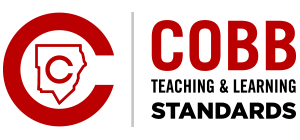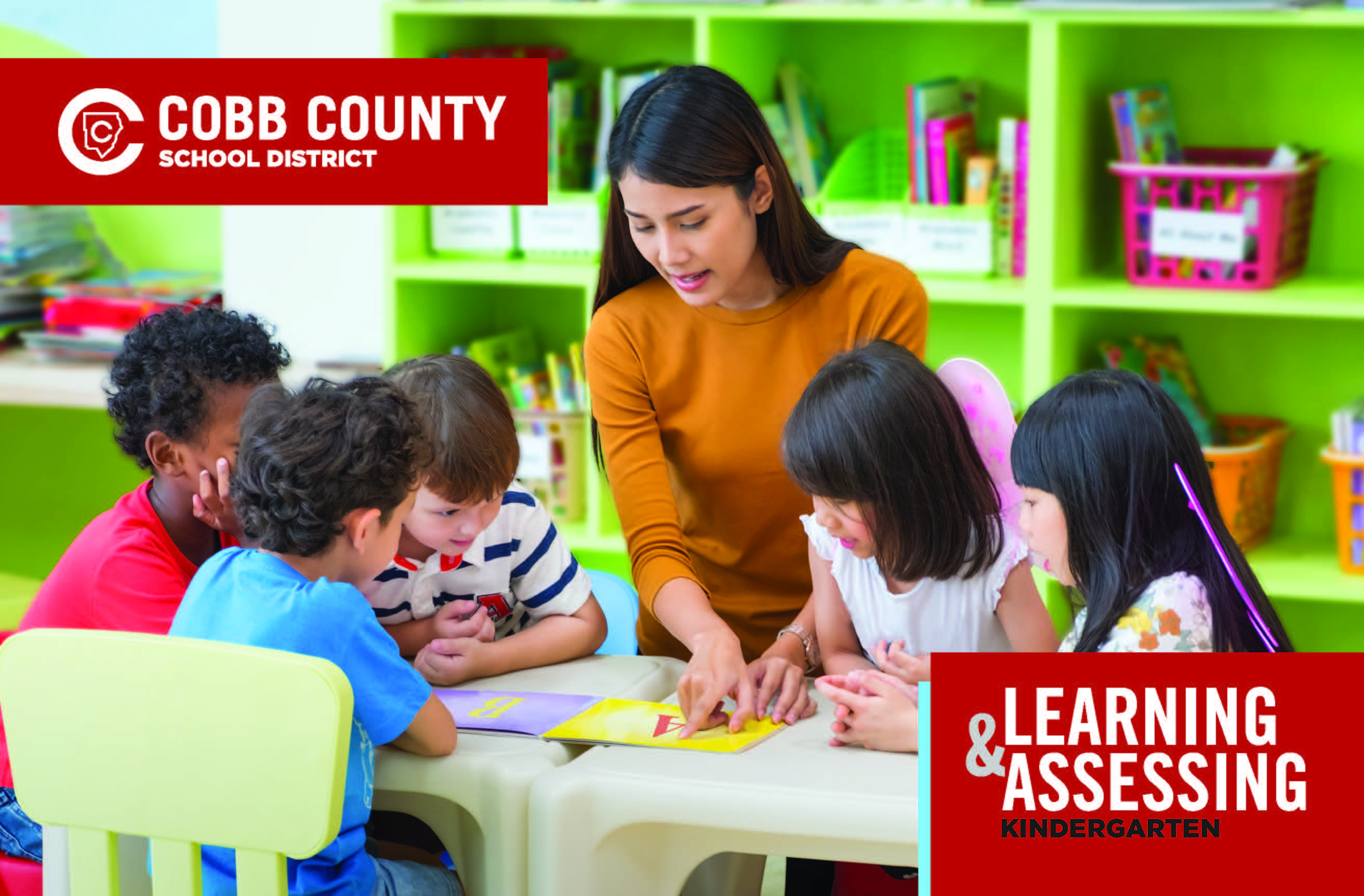Kindergarten Learning

What Do Students Learn In Kindergarten?
KINDERGARTEN LEARNING :
The Cobb County School District is committed to providing your child an academic experience that will develop his or her knowledge and skills at every grade level and to ensuring a strong foundation is established for your child to reach his or her greatest potential. Our teaching is aligned with content standards and our teachers bring those standards to life for your child through various strategies designed to meet your child’s learning strengths and needs.
In Cobb County classrooms, students are immersed every day in learning experiences based on exploration, problem-solving, and critical thinking in all content areas, including the core areas of English Language Arts, Mathematics, Social Studies, and Science; and in specialized academic content including Health, Music, Physical Education, Technology, Visual Arts, and World Languages*. Excellence in teaching guides your child’s educational experience from Kindergarten to graduation and into life.
*Programming available varies at local schools
ENGLISH LANGUAGE ARTS:
In Kindergarten, students begin building the foundations of literacy through structured instruction in sounds, letters, and language. They learn how spoken words connect to written print, setting the stage for fluent reading and effective writing. As they engage with storybooks, informational texts, and classroom conversations, students begin to develop key comprehension strategies such as asking questions, making predictions, and retelling. They explore their identities as readers and writers by selecting texts, participating in discussions, and expressing their ideas through drawings, letters, and simple sentences. Kindergarten students also learn that authors write for different audiences and purposes, and they begin to share their own ideas in both spoken and written forms. Through these experiences, they grow as curious, confident learners who are beginning to understand and enjoy the power of language.
MATHEMATICS:
In Kindergarten, instructional time should focus on two critical areas: (1) representing and comparing whole numbers, initially with sets of objects; (2) describing shapes and space. More learning time in kindergarten should be devoted to numbers than to other topics. Being intentional with ongoing exposure to mathematical concepts such as counting and shape identification will support student efficacy and competence. Students use numbers, including written numerals, to represent quantities and to solve quantitative problems, such as counting objects in a set; counting out a given number of objects; comparing sets or numerals; and modeling simple joining and separating situations with sets of objects, or eventually with equations such as 5 + 2 = 7 and 7 – 2 = 5. (Kindergarten students should see addition and subtraction equations, and student writing of equations in kindergarten is encouraged, but it is not required.) Students choose, combine, and apply effective strategies for answering quantitative and statistical questions, including quickly recognizing the quantity of a small sets of objects, counting and producing sets of given sizes, counting the number of objects in combined sets, or counting the number of objects that remain in a set after some are taken away. Students describe their physical environment using geometric ideas (e.g., shape, orientation, spatial relations) and vocabulary. They identify, name, and describe basic two-dimensional shapes (squares, circles, triangles, rectangles, hexagons, and octagons) presented in a variety of ways (e.g., with different sizes and orientations), as well as three-dimensional shapes (cubes, cones, cylinders, and spheres). They use basic shapes and spatial reasoning to model objects in their environment and to construct more complex shapes.
SCIENCE:
In Kindergarten, science comes to life through hands-on, student-centered exploration of the natural world. Students dive into Earth, Life, and Physical Science, laying the foundation for core scientific concepts. They explore the world of plants, deepen their understanding of living organisms, and learn to distinguish between living and non-living matter. Kindergarteners also begin their journey into the basics of rocks, motion, and matter, building early ideas that shape their understanding of how the world works.
SOCIAL STUDIES:
In kindergarten, students begin to understand the foundations of the social studies strands: history, geography, government, and economics. Students begin their introduction to United States history through the study of important American holidays and symbols. Basic concepts of geography are presented. Civics provides students with an introduction to rules and character traits of good citizens. Basic economic concepts are also introduced.
SPECIALS:
Young learners enjoy the creative process in the Fine Arts classes, such as Visual Arts and Music. In Art, students begin learning basic art vocabulary and produce art with different subjects and themes. In Music, they perform and demonstrate a basic understanding of pitch and rhythm. In Physical Education, students explore movement, learn to share and take turns. Health class prepares them to be safe; students learn how to compare and contrast accident prevention strategies.
PARENTS TIPS: Reading
Daily reading as a family is an enjoyable and important way to grow a love of learning. Create time to read during breakfast or in the evening before bed. Share your own favorite childhood books and talk about why the book is one you still love. Visit your local library and take advantage of school book fairs and literacy events. By sharing what you love about reading and showing them how much it means to you by reading with them, students will see how important literacy is in their lives.
How Do We Assess Students In Kindergarten?
Your child will have a variety of classroom assessments that will aid his or her teacher in knowing how to provide the best possible instruction for your child. These assessments will also help you know how well your child is learning and what extra support may be needed. In addition, your child will participate in some standardized assessments that are used to gauge how well your child is doing in his or her grade level.
In Kindergarten, teachers assess student progress using the Georgia Kindergarten Inventory of Developing Skills (GKIDS 2.0). The GKIDS 2.0 helps teachers identify strengths and needs of your child; and teachers adjust their instruction so learning is personalized to each student.
All students in grades K-9 participate in the universal screening process for reading and math using a digital inventory. In Kindergarten, the reading inventory measures foundational reading skills, such as letter/word identification, word recognition skills, and phonemic awareness.
TESTING IN KINDERGARTEN:
Mark the Calendar:
GKIDS Readiness Check: August & September
GKIDS: August, October, January & May
Student Growth Measure (SGM): August & May
Question Types: Kindergarten assessments include observations, analysis of student work, and direct assessment of skills. Students respond to teacher prompts and multiple-choice questions, called selected-response. Questions are often read aloud so young learners have a better chance of successfully completing all questions. Questions relate to subject areas such as Language Arts and Math and encourage students to apply a broad range of thinking skills.
PARENT TIPS: Assessment
Parents can support students in easing any concern or anxiety about assessment:
- Talk with your child about any tests or assessments.
- Explain that assessment is a natural and important part of any learning. Tests help students understand their thinking better and make improvements for better performance in the future.
- Remind your child to pay attention to the directions and to listen carefully as they are read. Encourage your child to take time to understand the questions before selecting an answer.
- A good night’s rest is the best way to arrive focused on test day!
Remember that assessment is an important and helpful part of learning for students of all ages. Your support and involvement in your child’s education is critical to success in school and in life. Research shows when parents play a key role in their child’s learning, their child’s achievement excels.
What Instructional Resources Are Used In Kindergarten?
CLICK HERE TO DOWNLOAD A LIST OF BOARD APPROVED INSTRUCTIONAL RESOURCES FOR KINDERGARTEN
Instructional resources are provided to students and teachers to support teaching and learning. The titles listed below have been recommended to our Board by a committee of teachers, parents and community representatives and approved through the textbook adoption process (See Board Rule IFAA-R). Additional resources to enhance the instruction are constantly added by local schools and individual teachers.
Course/Content Area | Resource | Publisher |
English Language Arts | Wonders | McGraw Hill |
Mathematics | Custom Developed Mathematics Content for Kindergarten | Cobb County School District |
Science | Georgia Science, Grade K | HMH |
Science | Science Dimensions | HMH |
Social Studies | Studies Weekly | Studies Weekly |
What Is My Student's Framework For Learning In Kindergarten?
What Does The Kindergarten Report Card Look Like?
English – Kindergarten Report Card (Rev. 3/25)
Español – Boleta de Calificaciones Kindergarten (Rev. 3/25)
Portugues –Relatório do jardim de infância (Rev. 3/25)

Cobb Teaching & Learning Standards - English Language Arts
CLICK HERE TO DOWNLOAD KINDERGARTEN COBB TEACHING & LEARNING STANDARDS FOR ELA
Cobb Teaching & Learning Standards - Mathematics
CLICK HERE TO DOWNLOAD KINDERGARTEN COBB TEACHING & LEARNING STANDARDS FOR MATH
Cobb Teaching & Learning Standards - Social Studies
CLICK HERE TO DOWNLOAD KINDERGARTEN COBB TEACHING & LEARNING STANDARDS FOR SOCIAL STUDIES
Cobb Teaching & Learning Standards - Science
CLICK HERE TO DOWNLOAD KINDERGARTEN COBB TEACHING & LEARNING STANDARDS FOR SCIENCE

